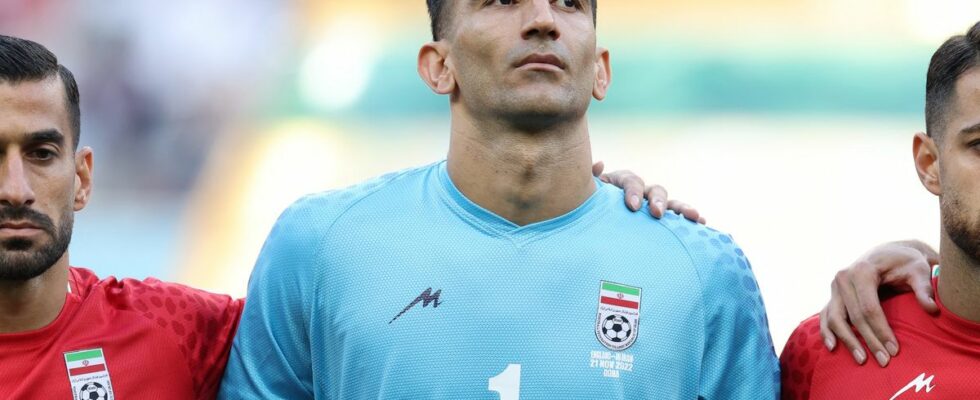The first strong image of this start of the Mondial. The eleven Iranian players refrained from singing their national anthem before the kick-off of their match against England on Monday in Doha.
During the week, their captain Alireza Jahanbakhsh explained that the players would decide “collectively” whether or not to sing the national anthem in support of the victims of the harshly repressed demonstrations in their country.
During this hymn, the cameras briefly showed the face of a spectator in her fifties, a white veil over her head, her face bathed in tears. The players kept their faces completely impassive, while on the bench, a member of the delegation sang. Physically diminished, the star of the team Sardar Azmoun, who denounced the repression on social networks, does not hold.
“Women Life Freedom”, could be read in English on a banner in the stands occupied by the Iranians, which, withdrawn, quickly disappeared.
Not a first
Since the beginning of the uprising in Iran, caused by the death on September 16 of the young Mahsa Amini (22 years old), arrested by the morality police in Tehran for not having respected the strict dress code imposed by the regime, the refusal to singing the anthem of the Islamic Republic has become one of the levers used by Iranian sportsmen to show their support for the movement.
On September 27, the national football team had already refused to sing this song before a friendly preparation match for the World Cup played in Austria against Senegal (1-1). Dressed in a black parka devoid of any crest and hiding the Federation logo, the players remained silent, most with their heads bowed.
This symbolic gesture, sometimes coupled with the wearing of a black armband as a sign of mourning, has since been taken up by many other Iranian athletes during competitions abroad. On 6 November, during an international beach-soccer tournament in Dubai, one of the most prestigious in the discipline, the Iranian team also imitated “Team Melli”, forcing state television to cut off the live broadcast.
At the end of the final, won against Brazil (2-1), the players remained silent when receiving the cup. The author of the winning goal, Said Piramoun, for his part, showed his solidarity with the protest movement and women in Iran by pretending to cut his hair with his fingers. Striker Alireza Jahanbakhsh, who plays for Feyenoord Rotterdam, also said on Wednesday that whether or not to celebrate a possible goal during the World Cup would be a “personal” choice.
Former glory Karimi on the front line
Beyond the field, many athletes, former or still active, have written messages of support for the protesters on social networks. One of the most active in this regard is former Bayern Munich player Ali Karimi, who lives abroad and whose house was confiscated by the authorities. He later declined an invitation from FIFA and World Cup organizers to travel to Qatar to watch the competition, as did Iranian soccer legend Ali Daei.
On Sunday, the Iranian justice announced that it had summoned Yahya Golmohammadi, former international and current coach of the Persepolis club, who had strongly criticized on Instagram last week the players of the national team for not “bringing the voice of the oppressed people to the ears of the authorities”, after their meeting with the ultra-conservative president Ebrahim Raïsi. A meeting that took place just before their departure for Qatar and the World Cup. They responded on the ground.

